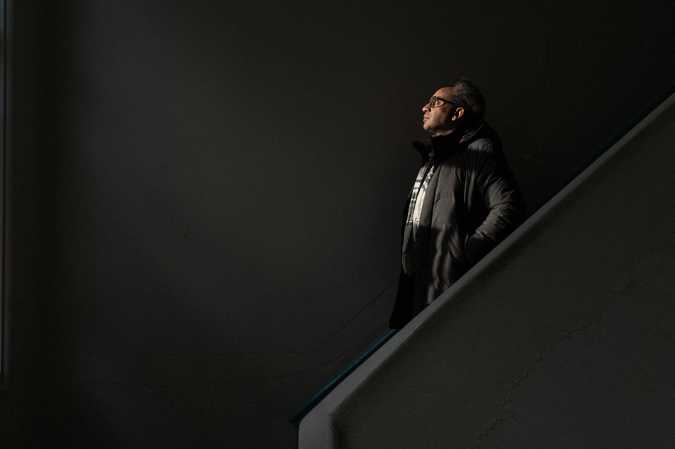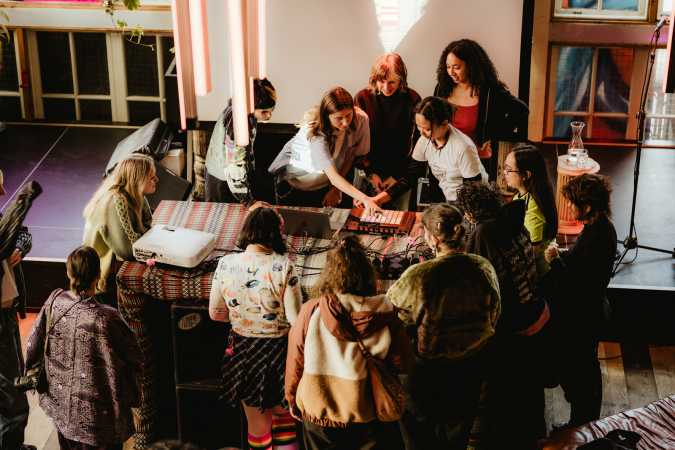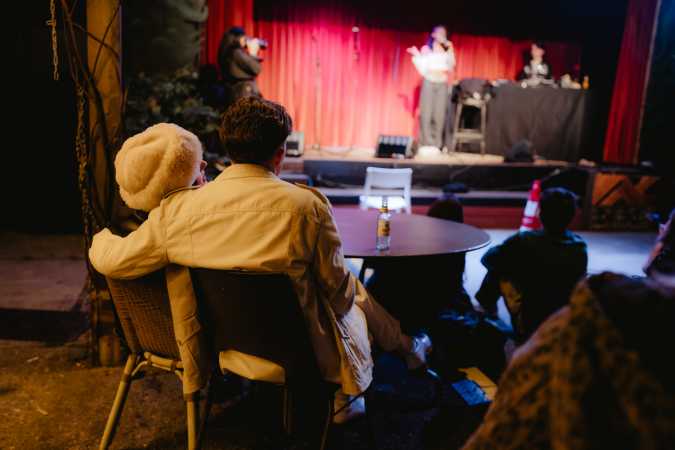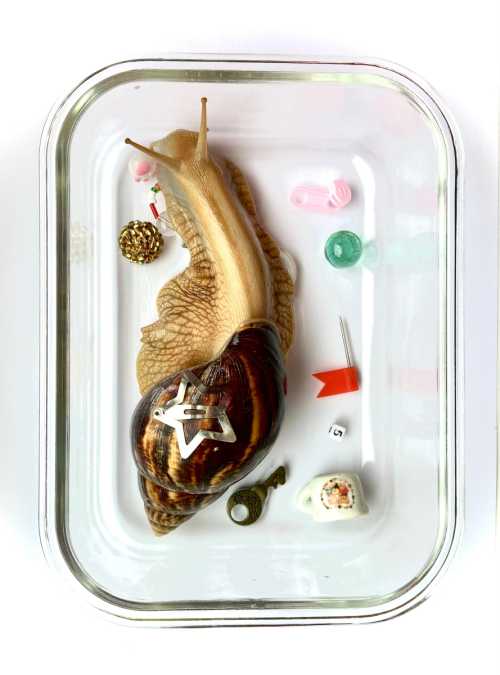Vanity Roxane is a DJ by night and a cultural advisor by day. Her work bridges the gap between heritage, policy, and creating – with a special focus on hip-hop, sound system culture, and gender equality. She is the founder of The FemDem, a collective to empower womxn+, ruling the soundwaves.
The FemDem, a collective of Fem+ DJs and producers, is committed to paving the path for Fem+ people in the electronic music scene, empowering each other, and solidarity amongst communities.
Here, writer and activist Saina Salarian talks with Vanity Roxane about her passion for music and community, and how the two are intertwined. They talk about crate-digging, The FemDem, cultural heritage, grassroots communities, and what she has envisioned for her program at U? Festival this November.
S: In what ways does this field have these extra barriers for women, non-binary, and trans people?
V: I often feel that my male peers are not unwelcoming. The system is not really built for women, and that makes it really difficult to enter, to move within it. That's the barriers they encounter.
S: What do you mean by this more systemic barrier? Is it due to the fact that because there aren't so many women in that scene, it's a bit harder to envision yourself?
V: That's a very good point. Representation, foremost. But also small things like when you enter a dressing room and there's not a separate space for women where they can change. Sometimes at festivals there's not even a sink and if you’re on your period [it makes it more challenging]. It's all those little things that the system wasn't built for us. A lot more representation [helps]. I use this example a lot, but last year I was playing at a big dubstep event and I was the only girl on a lineup with 20 guys!
S: Does this kind of programming make you feel tokenized?
V: Not always, because I know that I've been around for a very long time and I don't feel like a token anymore. Which is great!
S: How did you manage to navigate that world and scene when you first started out? For example, sometimes even when you walk into a record store, most people who are there are guys and sometimes all the staring can make it heavy. How did you maneuver it as a young DJ?
V: When I first started DJing, I was so shy. I'm very much an introvert. But I started out with another girl and we were in a DJ collective for a very long time. We were always there for each other, which was nice, and it was less scary to stand in the DJ booth. Not that it wasn't intimidating, but less intimidating because we did it together.
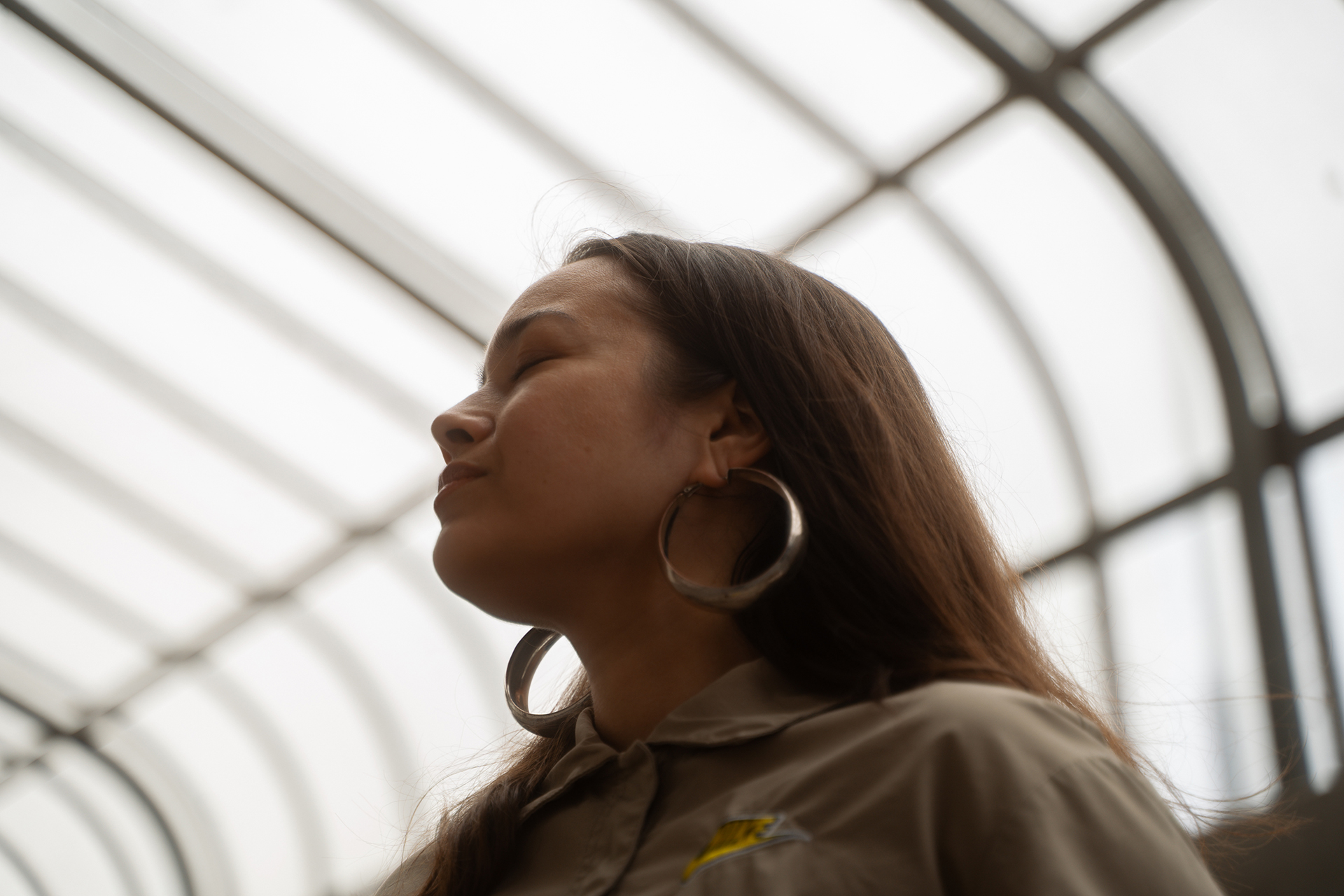
[About] the record store thing you mentioned I think I had that less, because I come from a family with a lot of crate-diggers, actually. So in the beginning, I often went to the record stores with my uncle and he just showed me around. And I had cousins that were also crate-digging, so it was like a family thing!
S: It's so fascinating that you have family who are crate-diggers and selectors too. How do you think their taste of music affected yours?
V: Oh, that definitely influenced me. I grew up with an uncle that was very deeply into hip-hop, fusion, jazz, jazz funk and all that, and he really influenced me. He's still a crazy crate-digger, searching for really rare Japanese issues of some weird funk record I've never heard of. He's still very very active doing that, as is my cousin. My cousin is a DJ in the breakdance community and he travels all over the world to play gigs or for battles.
S: Have you ever all played together or is it an idea for one day?!
V: No, we haven't. I was on a lineup once with my cousin in Eindhoven and I found that so funny. But my uncle should be there too. That would be cool. Yeah, absolutely. So lovely!
S: Let's talk about The FemDem a little bit more: how would you describe it for our audience?
V: I would describe it as a platform for DJs and producers in the electronic music industry focused on Fem+. We have a monthly radio show at Open Source Radio. We curate a lot. I'm currently working on a program with U?. I'm curating Museum Nacht in Enschede for the Reisopera, which is something really different. We are producing a song camp for two days for music producers as well. And I'm also speaking at ADE Beats for The FemDem. Busy month, but I’m looking forward to it!
S: What will The FemDem program at U? look like? What can the audience expect?
V: It's going to be more like a community type of day and I really hope to connect more with the Utrecht communities.
There will be a really nice music production workshop with Victoria (rEmPiT g0dDe$$) and Lynn (LnDH). Really looking forward to meeting them and also learning about their stories, their backgrounds, how they get to the point where they are as an artist. I always find that type of background stories very intriguing.
S: Who are the other tutors, mentors, speakers, etc.?
V: I'm really happy that we're having the music production workshop I just mentioned. We're going to have a talk about the same themes and DJ sets by Loma Doom, who I'm really excited about because I love, love, love her selection, and Latoya, really looking forward to hearing her play as well. She's going to be part of the talk as well and I know that she has a very good perspective on how to be a woman in the industry, also from a programmer perspective working for Dekmantel Festival. I really respect her a lot. So I'm really happy that she's part of this event.
S: Sounds like a great program! There are initiatives like The FemDem or AMPFEMININE who put FLINTA people at the forefront, but it sometimes feels like such collectives are hard to find if you’re not in the music scene to some extent. Do you think working with many festivals and organizations as you do, helps [to make it more accessible for Fem+ to pursue their interests]?
V: Yes, that's correct. But also shout out to U?, because if you put out an open call and you give communities the space that's quite powerful. It really gives you a space for people to enter who are not already in your network. I think that's great. And also, normally I have to do everything - I have to program, I have to do production, I have to communicate with everyone I wanna book - but now there's like a team doing half of the work and it's already so chill and light for me to do everything. So, yeah. Amazing!
S: It seems to be the case that in the Netherlands most of the resources, opportunities, and venues are really centered in Randstad or specifically in Amsterdam. I was wondering how it is in Enschede? How does your collective and other collectives tackle it in some ways?
V: Yeah, I do feel that if you are not from Randstad you have to work harder to get any work done, because it takes more effort to connect with certain bigger players in the scene. So I really agree with that and I feel just moving in my own region is pretty easy because, next to another collective called Femxle Frontier, we are the only two collectives that are really vouching for Fem+ artists. The founder of Femxle Frontier and I work a lot together. We try to set up talks together at local regional festivals. I played at their festival a few weeks ago. If there's open calls or we need help with anything we always help each other.
I mean if Femxle Frontier is winning I am winning as well, it's that beautiful. There is so much power in community.
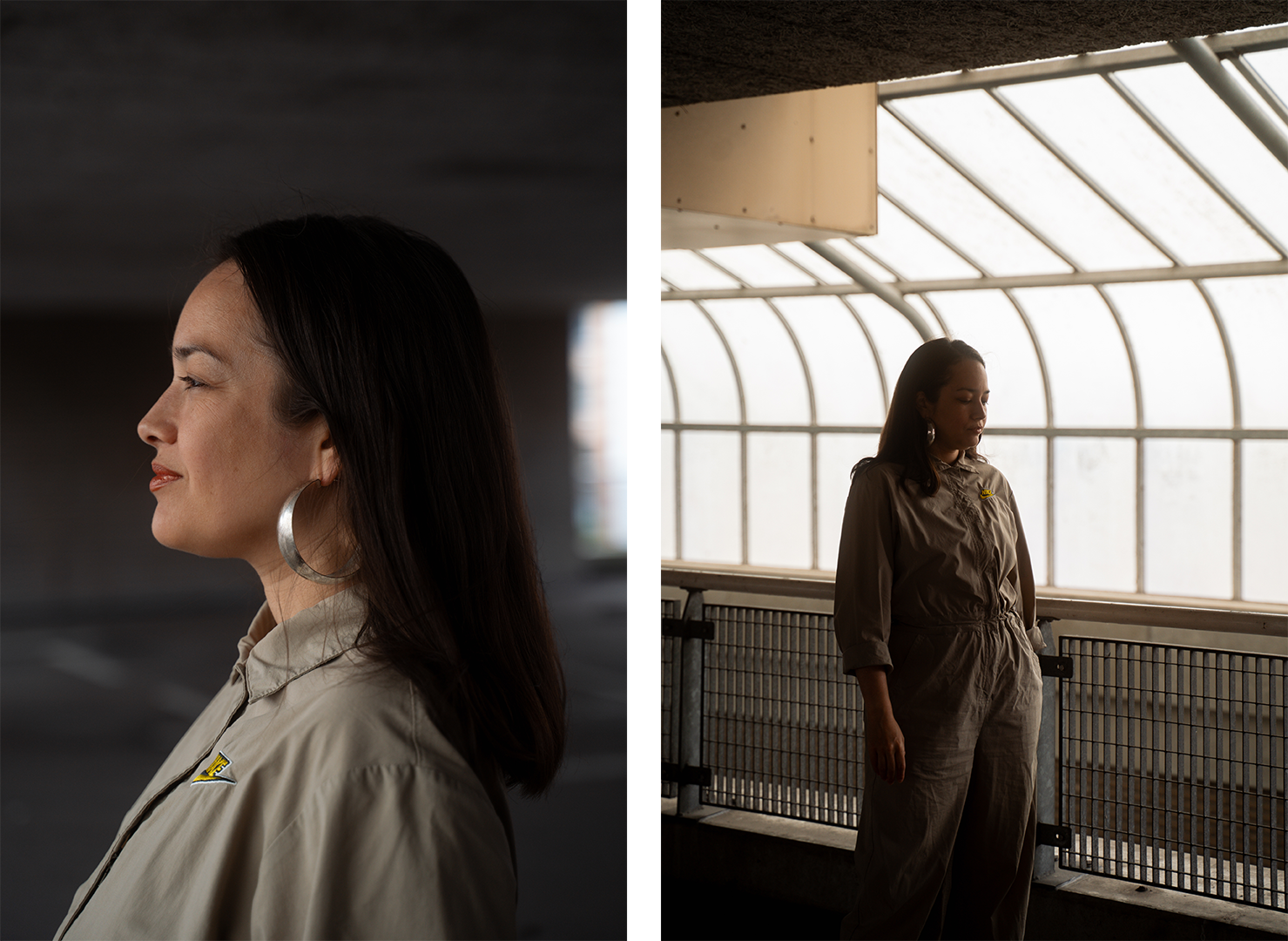
S: Earlier we talked about how your uncle influenced your taste in music. Do you think your heritage from diasporic backgrounds shaped the ways you're working with your passions too?
V: That's a wonderful question. My parents are partly from Indonesia, Java to be more precise. I feel that as a growing adult, I slowly start to tap into my heritage a bit more, because I feel that there wasn't really a space for that when growing up. I feel that my parents [generation] were focused on adapting to being Dutch.
I don't think it really shaped me musically. Maybe I'll answer this differently in a few years, but I feel that it didn't influence me growing up. But I do have a lot of questions, and I am diving a lot more into the music from Indonesia.
I am still connected to the people I've met there and it really opened the door to more Indonesian people, more music discovery. It actually made me decide to go to Indonesia at the end of the year!
S: This is so heartwarming to hear, especially knowing how much Insan, the curator of Nusaqueer, put their heart and soul into that program!
V: Yeah, I love what they did there. That really opened a door for me. I find their perspective on what it means to be Indonesian very refreshing, because you see many Indonesian identities that have been shaped by the Dutch perspective on it. I think they’re doing a really good job.
S: I’m curious to know more about your musical inspirations.
V: I was shaped a lot within the breakdance community. I wasn't a dancer, but I went there a lot as a youngster to just enjoy the music, the jamming and just the energy of it. And I always feel that the breakdance community, music-wise, is a melting pot of really crazy funk breaks, hip-hop, electro, drum and bass, and soul, and I always like this eclectic approach of music. That is still something I take with me whenever I play. I was shaped in the hip-hop scene but I play a lot in the drum and bass scene, always on the very soulful side of things. One of the people who really inspire me is Lenzman, a drum and bass DJ from Amsterdam. His label is called The North Quarter.
I always loved what he did musically, because he really bridges hip-hop and drum and bass, I would say. And at some point, he asked me to come play for the label. Nowadays, I'm a DJ resident there, that's really crazy to me! Another inspiration, I would say, is most definitely J Dilla, because its soulfulness. And another inspiration is my uncle obviously!
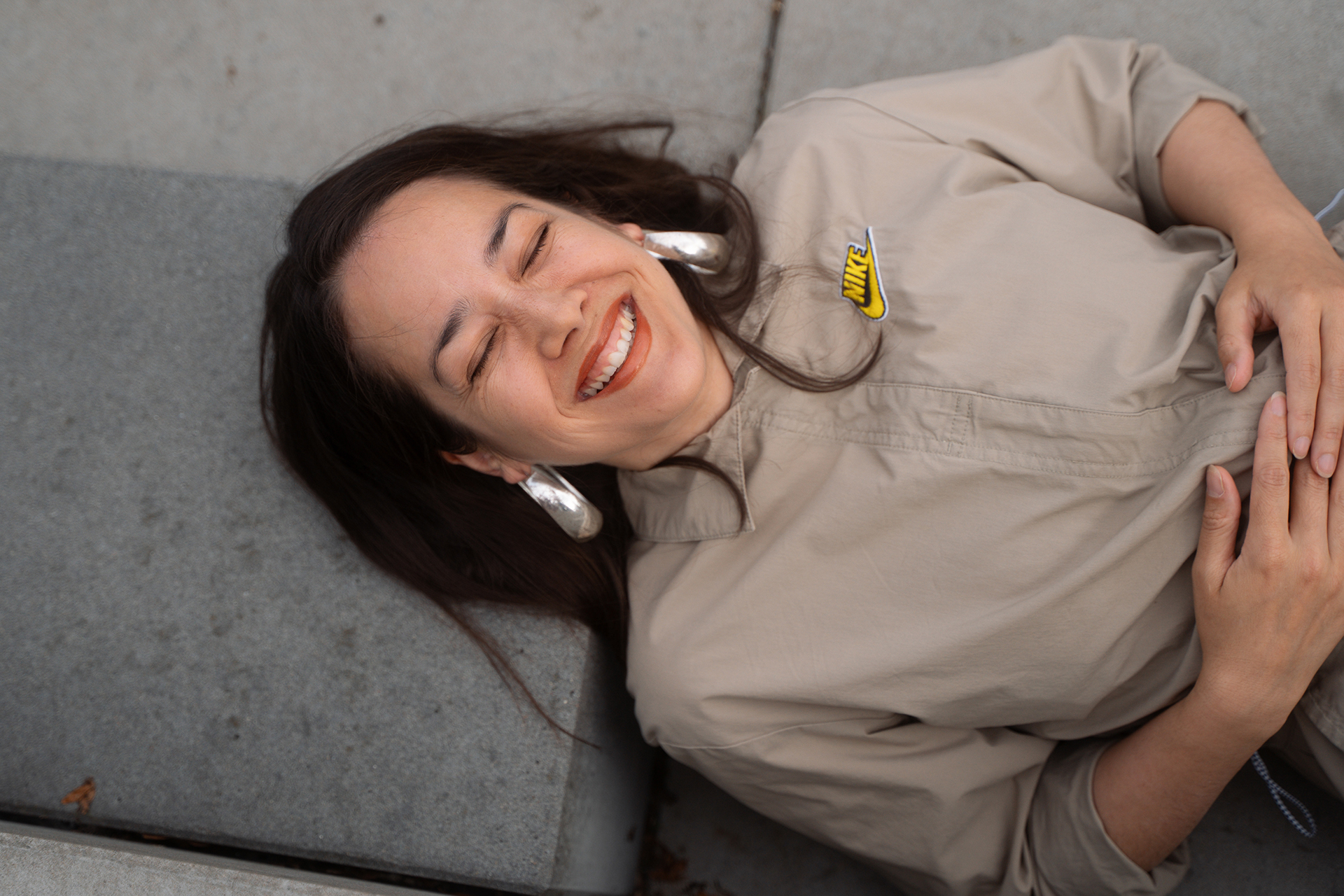
S: How would you envision the future of The FemDem?
V: Well, the coolest thing would be that it doesn't have to exist anymore, but it's way too much fun to connect to other women to not exist anymore! Complete gender equality may still take time, but I’m excited by all the initiatives that are pushing things forward. We still have a lot of work to do. I hope to do the work with a lot of like-minded souls and meet more cool people while doing it.
The FemDem presents: We Survive in Sync takes place on Saturday, 8 November.
Words by Saina Salarian
Photography by Tengbeh Kamara
